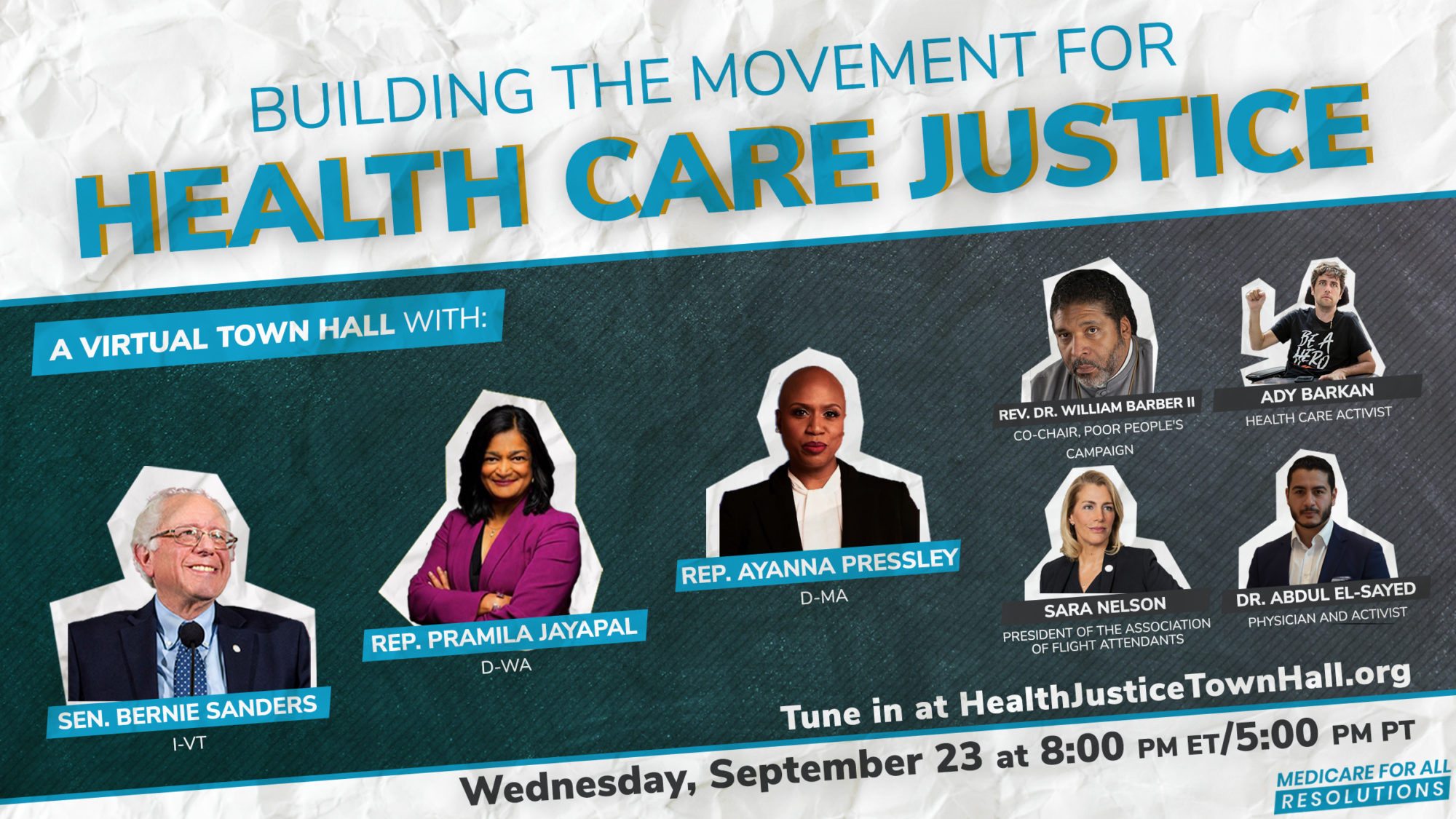Sanders, Jayapal, Pressley, National Leaders Emphasize Need for Health Care Justice in Virtual Town Hall
Communities of Color Face Discrimination, Poor Health Outcomes Under For-Profit Health Care

WASHINGTON, D.C. – The for-profit health care system has failed communities of color and is a major barrier to achieving health justice, U.S. Sen. Bernie Sanders (I-Vt.) and U.S. Reps. Pramila Jayapal (D-Wash.), Ayanna Pressley (D-Mass.) and more than a dozen health leaders said during a Public Citizen-hosted virtual town hall Wednesday night.
Townhall panelists discussed why Medicare for All is an essential step in preventing needless pain and suffering for communities of color and ending racial health disparities, including lower rates of coverage and poorer health outcomes. Speakers, including single-payer activist Ady Barkan and Rev. William Barber II of the Poor People’s Campaign, also highlighted the growing Medicare for All movement and the push for local grassroots resolutions.
“During this pandemic, we have seen tens of millions of people lose their jobs. For many American families, loss of employment means loss of health care,” said U.S. Sen. Bernie Sanders (I-Vt.) “Please understand that of all the major industrialized countries in the world, there is one country – the United States of America – that does not guarantee health care to all people as a human right.”
The COVID-19 pandemic has underlined the for-profit health care system’s endemic inequalities. Black and Hispanic Americans are more than twice as likely as whites to contract COVID-19 and suffer its most severe consequences, such as hospitalization and death.
“Let’s just be really clear about the disproportionate burden that Black, Brown, and Indigenous folks are bearing across this country,” said U.S. Rep. Pramila Jayapal (D-Wash.) “It’s not that they just happen to be more affected by COVID-19. It is not because they are not taking care of themselves that they are dying at disproportionate rates. It’s because of systemic racism in our health care system that has denied people the care they need, forced them to live in toxic environments, and put them at the bottom of the wage scale so they don’t even have the basic protections that every essential worker should have even as they are taking care of the rest of the country.”
“These inequities and disparities, these racial injustices, these health care injustices are not naturally occurring,” said U.S. Rep. Ayanna Pressley (D-Mass.) “They are legislated. These are policy choices—and we must be just as precise and intentional about confronting these injustices and affirming health care as the human right that it is.”
Beyond the pandemic, Native and Black Americans, on average, live four years less than white Americans and infant mortality rates are more than twice as high for Blacks than whites. Black women are also three to four times more likely to die during childbirth. Many of these health disparities are exacerbated by inadequate coverage for Black and Hispanic Americans, which severely lags behind that of white Americans.
“There was a lot of death going on before COVID-19. Seven hundred people died a day from poverty before COVID-19 and a quarter-million people were dying a year from poverty and low wealth,” said Rev. William Barber II, co-chair of the Poor People’s Campaign.
“Healthcare is a human right,” said Sara Nelson, president, Association of Flight Attendants. “Tying coverage to work puts people in double-jeopardy when their job is lost during a national crisis or for any other reason, adding inhumane stress and pain. For-profit, employer-based healthcare is immoral. We have a moral obligation to end it with Medicare For All.”
Given the overwhelming evidence supporting transformative change to our health care system, the experts emphasized the need to organize locally in red, blue and purple states. Already, activists have won local resolutions supporting Medicare for All in 45 localities, from Los Angeles to Knoxville.
“The tremendous greed of the for-profit health insurance system, even in the face of a pandemic, highlights why we need Medicare for All,” said Melinda St. Louis, director of Public Citizen’s Medicare for All Campaign. “That’s why activists in hundreds of cities are mobilizing to urge their city councils to win Medicare for All resolutions and join in advocacy toward Congress.”
“This is one of those issues where the public is way ahead of most politicians. The public understands that health care is a right, not a privilege, said Rahna Epting, executive director of MoveOn. “Now we need more of the politicians to listen to us. Change never comes from Washington, change comes to Washington.”
“Hope is not a state of mind. It is a state of action. By organizing together to fight and win, I know it’s possible to realize the dream of health care for all of us,” said Ady Barkan, campaigner at the Center for Popular Democracy and co-founder of Be A Hero.
Activists can sign up to join the Medicare for All grassroots community here.
To speak with Melinda St. Louis on Public Citizen’s ongoing Medicare for All resolutions and legislative efforts, please contact Mike Stankiewicz at mstankiewicz@citizen or (202) 588-7779.